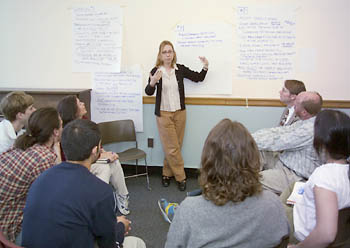Summit pulls together what Cornell should pursue in quest to be more sustainable
By Susan S. Lang

ITHACA, N.Y. -- How can the Cornell University campus do more when it comes to energy efficiency, recycling, reducing pollution, preserving green areas and other efforts that promote sustainability?
Themes that emerged from the first-ever Campus Sustainability Summit April 14 in Anabel Taylor Hall included: brief incoming students on the ways they can help to be more energy efficient and reduce the waste stream; hire staff to promote and coordinate sustainability efforts on campus; encourage making any new building on campus meet "green" standards; collaborate with the larger community to make a greater effort to support local vendors; and develop a set of indicators to monitor the success of sustainability efforts.
These are but a few of the almost two dozen themes that more than 80 students, faculty, administrators and staff from across campus came up with at the summit, held to help develop a vision for collective action over the coming year on how Cornell can become a more sustainable campus.
The summit's purpose was to bring together diverse campus stakeholders for discussion and input into efforts to improve Cornell's ecological, social and economic impacts, explained Garrett Meigs '04, the campus sustainability intern who helped organize the summit for the Cornell Sustainable Campus Initiative. Meigs, who works for Hal Craft, Cornell vice president for administration and chief financial officer, coordinated the event with three professional facilitators: Yvette Rubio and Kathy Burkgren from Cornell's Administration, Facilities and Finance Human Resource Development Services, and Laurie Cecere of the Environmental Compliance Office.
The summit was the centerpiece of Campus Sustainability Month at Cornell, a series of events during April highlighting the importance of sustainable development on the Ithaca campus, in the region and globally. Forthcoming events include an Earth Day Celebration and Student Sustainability Summit (April 22) and the Iscol Lecture and visit to Cornell by Gro Harlem Brundtland, former Norwegian prime minister and director general emeritus of the World Helath Organizatiaon. (April 28-29). A comprehensive schedule is available online.
Meigs and other summit organizers will synthesize the ideas generated from the summit into a report to provide campus input into Cornell President Jeffrey Lehman's sustainability challenge to advance the goal of forming an integrated sustainability initiative on campus.
The report will be posted on the Cornell Sustainable Campus Web site.
The summit followed the "world café" model, in which participants brainstorm in groups of eight. Each group had a facilitator and a scribe who recorded the ideas discussed by the group. Periodically, the participants were directed to change their focus or to move into different groupings. The discussions focused on: What steps does Cornell need to take to accomplish campus sustainability? What structures of collaborations should Cornell develop to advance the goal of campus sustainability? What would be effective indicators to monitor campus sustainability progress?
"We should have incentives for green behaviors of all kinds," suggested Christina Tonitto, a postdoctoral associate in horticulture, during the first roundtable discussion. Added Marguerite Wells, a horticulture distance-learning specialist, "If Cornell were more locally focused, a lot of people would respond."
"It was nice to have incoming students read "Antigone," but what about trying what Ithaca College did," suggested Anke Wessels, director of Cornell's Center for Religion, Ethics and Social Policy, during a roundtable discussion. Last fall Ithaca College required its incoming students to read "Living Downstream," a book by an ecologist who looked at cancer and the environment. Wessels also suggested that in addition to gender and race-bias awareness education for students and staff, Cornell could address issues involving sustainability.
Among the undergraduate students attending was Hilary Corsun, a junior majoring in animal science. She suggested that Cornell make it easier for people to promote sustainability on campus by, for example, providing more recycling bins and replacing plastic forks with metal forks in dining halls.
"What you also want is a strong Day Hall commitment, but if it's strictly bureaucratic, it won't involve faculty and students," noted Joe Regenstein, professor of food science. He suggested a campuswide or even broader organization to work in concert with an administrative sustainability office. "That kind of pairing of structures would allow both groups to work together," he said.
A final theme that emerged from the summit was to find ways to "sustain the sustainability efforts and keep the momentum going."
Sponsors of the summit included the Office of the Provost; Center for the Environment; Center for Religion, Ethics and Social Policy; Environmental Compliance Office; Cornell Business Services; Cornell Dining; and several student-led environmental and social action organizations.
Media Contact
Get Cornell news delivered right to your inbox.
Subscribe